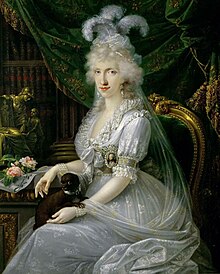| Princess Luisa of Naples and Sicily | |||||
|---|---|---|---|---|---|
| Grand Duchess of Tuscany | |||||
 Portrait by Joseph Dorffmeister, 1797 | |||||
| Grand Duchess consort of Tuscany | |||||
| Tenure | 15 August 1790 – 21 March 1801 | ||||
| Born | 27 July 1773 Royal Palace of Naples, Naples | ||||
| Died | 19 September 1802 (aged 29) Hofburg Palace, Vienna, Archduchy of Austria, Holy Roman Empire | ||||
| Burial | |||||
| Spouse | |||||
| Issue Detail | |||||
| |||||
| House | Bourbon-Two Sicilies | ||||
| Father | Ferdinand I of the Two Sicilies | ||||
| Mother | Maria Carolina of Austria | ||||
 Coat of arms of Luisa Maria as Grand Duchess of Tuscany | |||||
Luisa of Naples and Sicily (Luisa Maria Amalia Teresa; 27 July 1773 – 19 September 1802) was Grand Duchess of Tuscany as the wife of Ferdinand III, Grand Duke of Tuscany. She was born a princess of Naples and Sicily as a daughter born to Ferdinand I of the Two Sicilies and Maria Carolina of Austria.
The French painter Élisabeth Vigée Le Brun was commissioned to paint portraits of Luisa and her elder siblings. Vigée Le Brun dubbed Luisa as the “most ugly” daughter of Ferdinand and Maria Carolina, and was even reluctant to finish her portrait. In matter of fact, many disliked Luisa’s appearance, and found her to be unattractive. Despite this, Luisa was known to be kindhearted to those around her.[citation needed]
After eleven years of marriage, Luisa and her husband, Ferdinand, were unwillingly forced into exile upon the Treaty of Aranjuez in 1801. The couple soon fled to Vienna, Austria, where they would stay for nearly a year until Ferdinand compensated with the Electorate of Salzburg, giving him titles and land. Luisa, however, died aged 29, before her husband re-ascended the throne.